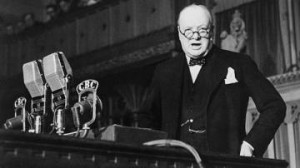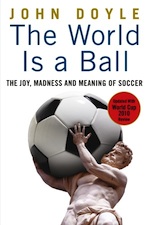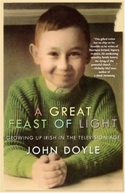
Rt. Hon. Winston Churchill adressing the House of Commons in Ottawa. Dec. 30, 1941. Library and Archives Canada
John Doyle
The Globe and Mail
Published on Monday, June 21, 2010
“On the day they were expected to produce their ‘finest hour’ to mark the 70th anniversary of Winston Churchill’s famous wartime speech, the Three Lions whimpered rather than roared.”
That’s what English tabloid The Sun declared on Saturday. It’s implausible that the mediocrities playing for England against Algeria the evening before had Winston Churchill or wartime on their minds. But The Sun did, and was not alone among English media outlets. The English supporters also tend to think of a World Cup campaign as a series of battles in a war to prove England’s superiority over cocky, preposterous foreigners.
The thinking is this: The foreigners are cocky, skilled even, but it is preposterous to think England’s bulldog spirit won’t win in the end. Two World Wars and one World Cup have proved that.
The problem is, there is more than a disconnect between the hysterical media hype and public expectation, and the players themselves. There is a vast chasm. All that talent in England. All that narcissism and confidence. All that money. All that English club success, and then these endlessly mediocre performances. The England players live in Premier League-created bubbles of indulgence and over-praise. They lack the discipline of the soldiers summoned into memory by The Sun and they lack the professional discipline of players from other countries. The team performing so poorly in South Africa contains a gaggle of binge-drinking serial adulterers and skirt-chasing, night-clubbing airheads.
Still, the iconography of war and wartime exploits is ceaselessly mustered in England. In March, shortly after Rio Ferdinand had been named England captain, The Sun (top-selling tabloid in England and the soccer-player’s favourite by all accounts) ran a feature story that began with a florid description of a English solider charging though the mud at the battle of the Somme, “with bayonet fixed” and dying a hero. Then the story declared: “Today The Sun can reveal this fallen hero of the First World War was the great-great grandfather of England captain Rio Ferdinand.”
That’s one unsubtle connection and suggestion that an England captain leading a team to the World Cup is leading his men to war.
In fact, war-like imagery tends to saturate coverage of the England team. I know this, I was at two of England’s qualifying games for this World Cup. The first, England’s first competitive game since failing to qualify fort Euro 2008, was at Wembley Stadium against the minnows Kazakhstan. The day before, the print edition of The Guardian carried a startling photo of the England team in training. In red shirts or rain jackets, running, arms swaying and fists at chest-level, they looked eerily familiar to any student of English history. They were the Red Coats, soldiers from another century. You could plausibly Photoshop muskets into their arms. They were stouthearted chaps, armed and ready for action.
The second game, by which time England had secured qualification, was against another minnow country, Belarus, at Wembley. At the game, members of the British armed forces, in uniform, carried the flags of the countries into the field. Clearly the warlike imagery and the belief in a glorious is believed to help to inspire some players.
And then there is, or was until recently, the WAGS (wives and girlfriends of the players) phenomenon. It’s not happening in South Africa because manager Fabio Capello banned it but, usually, at every England game, at home or abroad, there are the WAGS corralled in an exclusive area, near the press, but with a better view of the field. It’s uncanny how those gathered women – pampered, tanned, and in giant sunglasses, even on grey afternoons – resemble the wives, fiancés and mistresses of English generals who gathered for a picnic and fine view of the battles in the Crimean or other Wars.
In this surreal atmosphere of war-imagery, there is, of course, a tendency to blame the foreigner when things go awry. Now, the English media has turned on Fabio Capello. He’s a successful manager, a disciplinarian, and he got England to this World Cup with aplomb. But he’s Italian. His tactics, choices and even treatment of players re criticized – he banned the WAGS, banned cell phones and doesn’t show the star players enough respect. He’s become a figure of suspicion.
The latest news from the England camp on Sunday suggested that the team has turned against him. John Terry, stripped of the captaincy by Capello after having a lurid affair with the ex-girlfriend of a teammate, announced a “clear the air”, meeting with Capello. He also suggested Capello’s failure to play Joe Cole would arise. Now, Cole’s a good, creative player who can dazzle but he tends to do that playing for Chelsea, surrounded by an aristocracy of world-class players: the German Michael Ballack; the Ivory Coast’s Didier Drogba and Ghanaian Michael Essien. Capello has his reasons for not playing Cole. And the idea of Cole as saviour is flimsy. If the USA and Algeria can smother Wayne Rooney, Slovenia can probably smother Cole’s talents.
But the central point in the matter is this – the team questioning the manager is rather like soldiers defying their commanding officer. It isn’t done. But these are not soldiers. These are wimps shifting blame. The English media and the public don’t grasp that yet. Maybe they never will. It’s England’s old problem, and it won’t be solved on the battlefields of South Africa. Winston Churchill wouldn’t give these guys the time of day.


